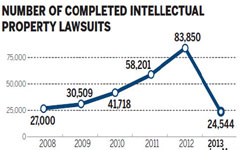Companies seek help with brand enforcement
By Cao Yin in Shenzhen, Guangdong (China Daily) Updated: 2014-04-28 07:16Some Chinese enterprises are finding it hard to provide evidence in intellectual property lawsuits and are calling on notary offices for more support in disputes.
Of particular concern is the gathering of evidence from online sources.
Zhou Yachao, from Guangdong Monalisa New Construction Material Group, said there have been about 7,000 stores selling the group's products without permits, and even supplying fake brand-name items through online shopping portal taobao.com, over the few past years.

|
|
 |
Zhou, with two other colleagues, works for the company's legal department.
"When I found an online store selling fake products using our brand name, I complained to network operators and the shop owner, but they always ignored me," he said.
"Sometimes online shops infringe on our company's intellectual property rights late at night, but the evidence I collect can be hard to get approved by notary offices that are not working at that time," he said.
The online vendors suspected of infringements might also disappear the next day, he said.
Liao Miaofen, manager of the legal department at Haday, or Hai Tian, a large manufacturer of flavoring in China, echoed Zhou, saying that her enterprise also encounters such problems during intellectual property disputes.
"Aside from getting the evidence, it's also difficult to evaluate our losses," she said, adding that this can be a major reason why the compensation in a lawsuit can be lower than expected.
"Our enterprise's reputation suffers the most as someone imitates our commodities. The intangible damage can be difficult to evaluate," she said.
- Singapore retains top yuan offshore clearing center outside HK
- Overcapacity, slowdown bring steel industry losses
- S China footwear factory resumes production
- Brunei, China sign carbon steel pipe project
- Third party mobile payment thrives
- Alibaba takes youku stake
- Time to focus on growth quality, IMF says
- Cloud computing brings revenue to western region
















